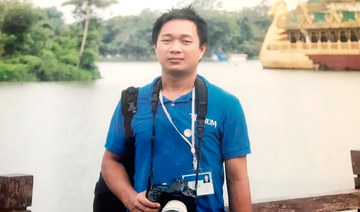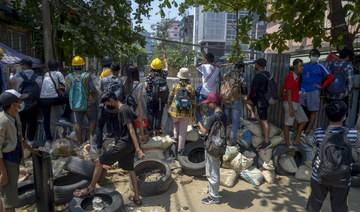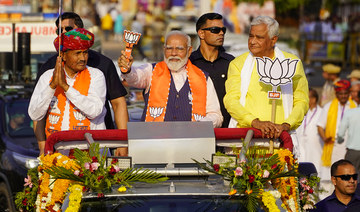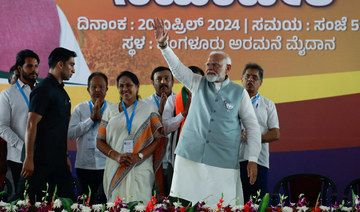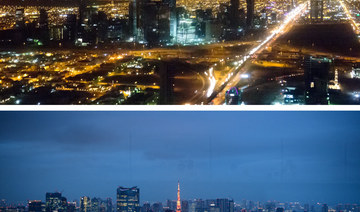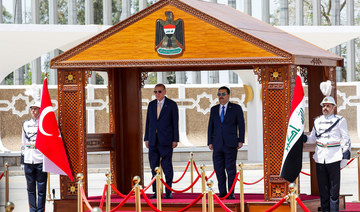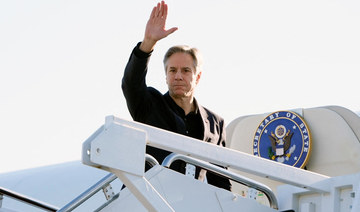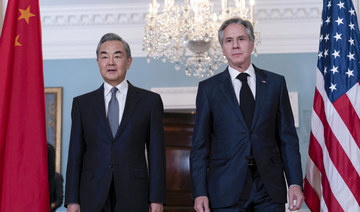YANGON: At least four people were shot dead during protests in Myanmar on Sunday, as security forces continued their violent crackdown against dissent following last month’s military coup.
Two of the victims were killed in Yangon, the country’s largest city. One of them was shot in the head and another was shot in the abdomen, according to local media covering the demonstrations in Hlaing Thar Yar Township.
A third person died in the northern city of Hpakant when police fired into a crowd of demonstrators, local media reported. A fourth victim, a woman, died after being shot in the head in Mandalay, the country’s second-largest city, as security forces were conducting clearance operations.
In Yangon, video posted on social media showed crowds of people, some wearing hard hats and gas masks, running down a street amid sounds of gunfire. The demonstrators quickly sprayed vapor from fire extinguishers as they retreated.
The use of fire extinguishers — common now in protests across Myanmar — is intended to smother tear gas and also create a vapor screen that makes it harder for police to pursue or shoot demonstrators.
There were also reports of injuries from live rounds and rubber bullets in other parts of Yangon, including Insein district, where billows of black smoke could be seen after security forces reportedly set roadblocks on fire.
On Saturday, the civilian leader of Myanmar’s government in hiding vowed to continue supporting a “revolution” to oust the military leaders who seized power in the Feb. 1 coup. Mahn Win Khaing Than, who was named the acting vice president by Myanmar’s ousted lawmakers and is a member of deposed leader Aung San Suu Kyi’s political party, addressed the public for the first time since the coup.
“This is the darkest moment of the nation and the moment that the dawn is close,” he said in a video posted on the shadow government’s website and social media.
“In order to form a federal democracy, which all ethnic brothers who have been suffering various kinds of oppressions from the dictatorship for decades really desired, this revolution is the chance for us to put our efforts together,” he said.
He added: “We will never give up to an unjust military, but we will carve our future together with our united power. Our mission must be accomplished.”
At the end of the message, he flashed the three-finger salute that has become a symbol of resistance to the military rulers.
Also Saturday, security forces again opened fire on demonstrators, killing four in Mandalay, two in Pyay in south-central Myanmar, and one in Twante, a suburb of Yangon. Details of all seven deaths were posted on multiple social media accounts, with some accompanied by photos of the victims.
The actual death toll is likely to be higher, as police apparently seized some bodies, and some of the victims suffered serious gunshot wounds that doctors and nurses working at makeshift clinics would be hard-pressed to treat. Many hospitals are occupied by security forces, and as a result are boycotted by medical personnel and shunned by protesters.
The independent UN human rights expert for Myanmar, Tom Andrews, said last week that credible reports indicated that at least 70 people had died so far, and cited growing evidence of crimes against humanity by the military.
Other unofficial but carefully compiled tallies put the number of deaths since the coup at around 90.
Saturday’s killings did not faze demonstrators in Yangon who crowded a downtown commercial area past the official 8 p.m. curfew to hold a mass candlelight vigil and sing about their cause. The mostly young protesters rallied at an intersection where they usually gather for daytime protests.
After-dark rallies were also held in Mandalay and elsewhere.
The nighttime protests may reflect a more aggressive approach to self-defense that has been advocated by some protesters. Police have been aggressively patrolling residential neighborhoods at night, firing into the air and setting off stun grenades as part of intimidation.
They have also been carrying out targeted raids, taking people from their homes with minimal resistance. In at least two known cases, the detainees died in custody within hours of being hauled away.
At least 4 people shot dead in Myanmar anti-coup protests
https://arab.news/wsrad
At least 4 people shot dead in Myanmar anti-coup protests
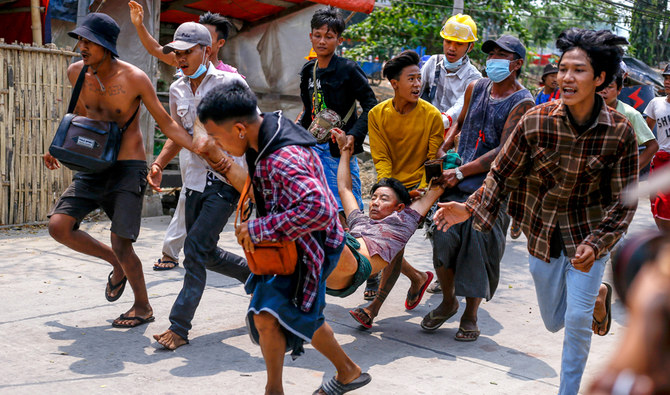
- We will never give up to an unjust military, but we will carve our future together with our united power
- Security forces continue their violent crackdown against dissent
Ukraine, Russia exchange fire, at least seven dead
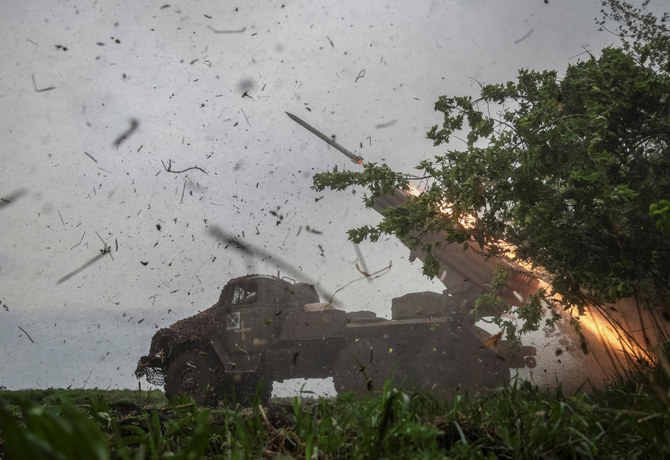
A Ukrainian attack drone left two dead in Zaporizhzhia and two more were killed by Ukranian artillery fire in Kherson
MOSCOW: Ukrainian and Russian forces exchanged drone and artillery fire on Thursday, leaving at least seven dead, regional officials on both sides of the frontline announced.
The uptick in civilian deaths came as Russian forces are pressing in hard in the eastern Donetsk region of Ukraine, ahead of events in Moscow on May 9, hailing the Soviet Union's victory in World War II.
A Ukrainian attack drone left two dead in the southern region of Zaporizhzhia and two more were killed by Ukranian artillery fire in the southern Kherson region, officials said.
The Kremlin claimed to have annexed both regions in late 2022 even though Russian forces are still battling to gain full control over them.
"A man and a woman were killed as a result of a strike on a civilian car. Their four young children were orphaned," the Russian-installed head of Zaporizhzhia, Evgeny Balitsky, wrote on social media.
He said the children would be taken into care and provided with psychological assistance.
The Russian head of the Kherson region, Vladimir Saldo, said separately that two more people were killed by Ukrainian fire in the village of Dnipryany.
The two frontline regions saw intense bouts of fighting in 2022 and the summer of 2023, when Ukraine launched a counteroffensive that failed to meet expectations in Zaporizhzhia.
The brunt of the fighting has since moved to the eastern Donetsk region, which is also claimed by Moscow as Russian territory.
The Ukrainian head of the Donetsk region, Vadim Filashkin, said three people had been killed in separate bouts of shelling in the villages of Udachne, where two people were killed, and in Kurakhivka, where one person was killed.
"The final consequences of the shelling have yet to be determined," he said.
Keralites in Gulf take ‘vote flights’ to join India’s mammoth polls
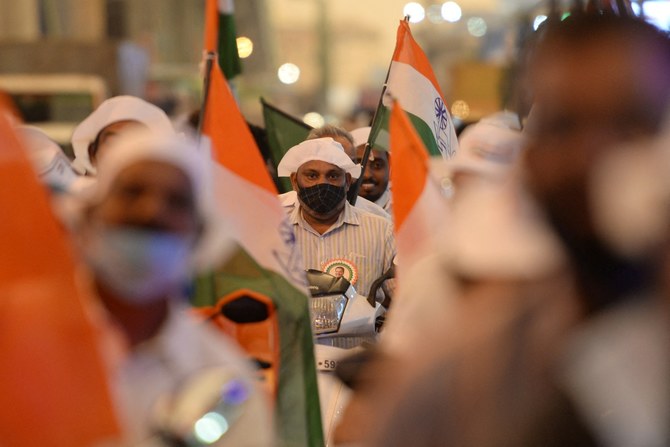
- ‘Vote flights’ are special chartered flights bringing Keralites home to cast ballots
- Kerala is the single main place of origin of Indian expats living in Gulf countries
NEW DELHI: Tens of thousands of Keralites working in Gulf countries are flying home to cast their ballots as the southern Indian state opens for voting on Friday in the world’s biggest general election.
India’s seven-phase polls started on April 19 and take place over the next six weeks, with more than 968 million people registered to vote.
Some states are completing the process in a day, and others have it spread out in several phases. Kerala is joining other 12 states, which according to the schedule go to the polls on April 26.
Indian nationals living overseas have been allowed to vote since 2011 and have to register with both the Election Commission of India and Indian embassies in their countries of residence. Their names will then appear on the voters’ list, but to cast their ballots, they still need to be physically present in their constituencies.
India has one of the world’s largest diasporas, especially in GCC countries, where at least 9 million Indian expats live and work. The southwestern coastal state of Kerala is the single main place of their origin. Some 3.5 million Keralites reside in Saudi Arabia, Oman, Kuwait, Qatar, Bahrain and the UAE.
“I think about 30,000 people have come from Saudi Arabia alone to vote. Not all of them have come on ‘vote viman’ (vote flights). Some have also come by regular flights,” said Iqbal Cheri, a marketing professional working in Dammam, who reached Kerala on Thursday.
Cheri referred to the flights that have been bringing citizens home to participate in Friday’s polls.
“They bring voters only and they are mostly chartered flights,” he said. “We have come here to vote and save our democracy and secularism. It’s an important election and we all need to vote to save the nation.”
His compatriot, Shareef Chola Paramdil, who works as a marketing head of a hospital in Dammam, said these election flights have been bringing Saudi Arabia-based Kerala voters home for the past few days.
“Last week, also three chartered flights came from Saudi Arabia,” he said.
“People who come on the chartered flights pay less compared to the regular flights, as group booking brings down the fare. Besides, these people don’t get more than a few days of leave. So, they come and cast their votes and leave the next day.”
There are 543 contested seats in the lower house of parliament. The party or coalition that wins at least 272 is going to form the government. The state of Kerala will contribute 20.
For Paramdil, the election is particularly important as a Muslim because incumbent Prime Minister Narendra Modi and his ruling Bharatiya Janata Party have been accused by the opposition and minority groups of marshaling majoritarian Hindu sentiment.
Critics say that India’s tradition of diversity and secularism has been under attack since Modi took power a decade ago and that his party has been fostering religious intolerance and discrimination.
“We want a government that does not discriminate in the name of religion, and we have been troubled by the politics of division that the government in Delhi has been practicing ever since it came to power in 2014,” Paramdil said.
Both Keralite Muslims and Hindus — like Gokul Padnabhan, a Kuwait-based professional in the oil and gas industry — see the election as an important exercise of their democratic rights.
“It’s very important to be here this time. That’s why I came for the vote,” Padnabhan said. “The vote will help us find the right person to rule us for the next five years.”
One of the organizations helping expat voters charter flights in Gulf countries is the Kerala Muslim Cultural Centre, an overseas wing of the Indian Union Muslim League.
“I feel around 100,000 people have come from the Gulf region to vote in this election,” said Ahamed Saju, head of the IUML’s student federation.
“Why they came is because this is a very crucial election this time ... Each and every vote is important. So, they thought that this time to protect our democracy, protect our constitution, protect our values and protect our secular credentials and the secular fabric of the country.”
Bangladeshis pray for rain as heatstroke deaths rise
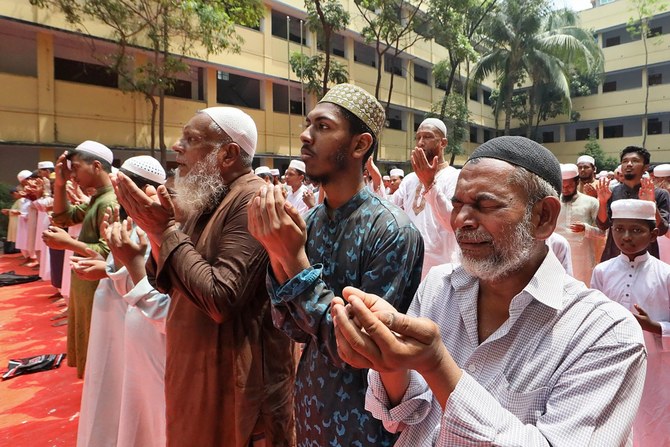
- Country is reaching limit of adaptability to extreme weather, report warns
- Heatwave has shut schools for 33m Bangladeshi children
DHAKA: Thousands of Bangladeshis have gathered in Dhaka to pray for rain in the middle of an extreme hot spell that has put health authorities on heatstroke alert.
The weather across the region is usually hot across the region in April before the summer monsoon season, but this year temperatures have been unusually high, reaching 42 degrees Celsius in parts of Bangladesh.
The country has been on alert since last week, as the punishing heatwave has disrupted agriculture, raised the risk of health complications and forced schools to close for 33 million children.
As the Bangladesh Meteorological Department renewed its warning that the heatwave is likely to persist during the weekend — or until a new notice is issued — thousands of people in Dhaka prayed on Wednesday and Thursday for relief.
They gathered in city mosques and rural fields to pray for rain.
“Special prayers for rain have been organized in many parts of Dhaka on Thursday. Thousands of people joined these prayers ... in addition to that, a special prayer for rain, which Muslims around the world have practiced since the days of the Prophet Muhammad, has taken place in many parts across the country,” Motiur Rahman Akand, spokesperson of the Bangladesh Jamaat-e-Islami, the country’s largest religious political party, which organized the prayers, told Arab News.
“When there is a natural crisis, especially drought, which causes severe suffering for human beings and all other living creatures, people should seek help from the Almighty to get relief from this situation.”
Hospitals were on high alert as at least 20 people died from heatstroke in the past five days alone.
“We have been preparing quite ahead for managing heatwave-related patients ... all the government health facilities are guided not to admit any other patients unless it’s an emergency,” Dr. Moinul Ahsan, director of the hospital wing of the Directorate General of Health Services, told Arab News.
“We are on alert and monitoring the situation closely. Working-class people are suffering most amid this heatwave ... children, pregnant women and the elderly are also most vulnerable in this situation.”
Bangladesh’s geography and low-lying delta topography make it particularly vulnerable to the adverse effects of climate change, and for the past two decades, the country has launched various environmental schemes to mitigate the worsening situation.
Ranking among the 10 countries most prone to climate devastation, Bangladesh has been recognized as a global leader in adaptation and resilience, and in 2005 was one of the first least-developed countries to launch a national adaptation program of action.
A report released in February by the International Centre for Climate Change and Development, a leading research institute in Dhaka, warned that Bangladesh is reaching the limit of its ability to adapt to extreme weather.
Turkiye offers Iraq technical help to bolster border security
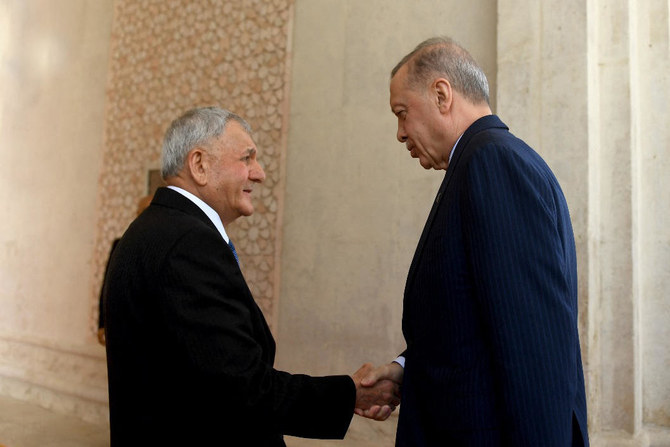
- A delegation from Iraq earlier visited Turkiye to examine the border security systems that Turkiye offered to provide
- Discussions for security cooperation still under way
ANKARA: Turkiye is in discussions with Iraq to provide technical assistance to Baghdad for securing its borders to prevent movements of outlawed Kurdistan Workers Party (PKK) militants around the region, a Turkish defense ministry official said on Thursday.
Turkish President Tayyip Erdogan visited Baghdad and Irbil this week as Ankara ramped up cross-border operations against PKK militants based in mountainous, mainly Kurdish northern Iraq.
The two countries agreed to a strategic framework agreement overseeing security, trade and energy as well as a defense cooperation deal during the visit.
“We told our counterparts that Turkiye is ready to provide assistance to Iraq on border security systems,” the Turkish official told reporters.
A delegation from Iraq earlier visited Turkiye to examine the border security systems that Turkiye offered to provide, the official also said, adding that the discussions for security cooperation were still under way.
During a joint press conference with Erdogan on Monday, Iraqi Prime Minister Mohammed Shia Al-Sudani said the two countries would cooperate to bolster border security, without mentioning the PKK specifically.
The PKK took up arms against the Turkish state in 1984 and is designated a terrorist organization by Ankara and its Western allies. Turkiye has conducted a series of cross-border operations against the group in northern Iraq since 2019.
Blinken calls for US, China to manage differences
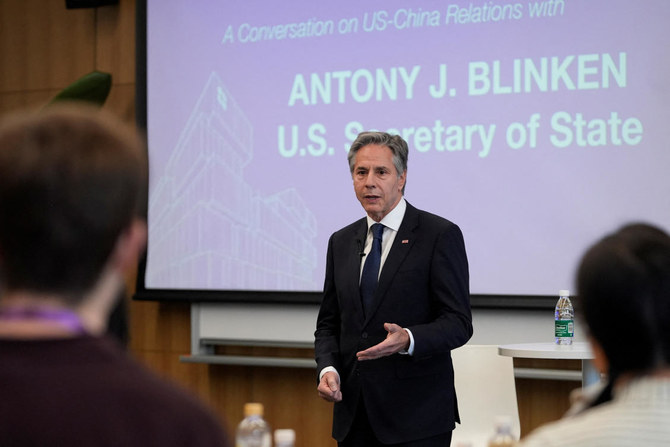
- China has not announced plans for US Secretary of State to meet Xi Jinping
- Antony Blinken is the first US secretary of state in 14 years to visit Shanghai
SHANGHAI: US Secretary of State Antony Blinken called Thursday on the United States and China to manage their differences “responsibly” as he went on a charm offensive ahead of expected tough talks.
A day before meeting Beijing’s top brass to tackle thorny issues including Russia, Taiwan and trade, Blinken’s visit to Shanghai has seen him sample local food, watch a basketball game and stroll along the city’s famous Bund promenade.
Visiting the local Communist Party leader in a room with sweeping views of the Shanghai skyline, Blinken said US President Joe Biden was committed to “direct and sustained” dialogue between the world’s two largest economies after years of mounting tension.
“I think it’s important to underscore the value — in fact, the necessity — of direct engagement, of speaking to each other, laying out our differences, which are real, seeking to work through them,” Blinken said.
“We have an obligation for our people — indeed an obligation to the world — to manage the relationship between our two countries responsibly.”
The Chinese Communist Party secretary for Shanghai, Chen Jining, welcomed Blinken partly in English and spoke of the importance of US businesses to the city.
“Whether we choose cooperation or confrontation affects the well-being of both peoples, both countries and the future of humanity,” Chen told him.
The country’s financial capital, Shanghai is often a stepping stone to power in China, with President Xi Jinping previously serving briefly in the city.
China has not announced plans for Blinken to meet Xi, although on Blinken’s last visit in June, they saw each other in a meeting announced at the last minute.
On Thursday, Blinken also met students at the Shanghai campus of New York University, where he voiced hope for more Americans to study in China.
He insisted the United States was committed to welcoming Chinese students.
Beijing has repeatedly alleged that Chinese nationals with valid travel documents, including students, have been subject to aggressive interrogations and deportations at US airports.
“President Biden and President Xi are determined to strengthen our people-to-people ties,” Blinken said.
Blinken, the first US secretary of state in 14 years to visit Shanghai, opened his visit Wednesday evening at a restaurant serving steamed buns.
Sporting a suit without a tie, he ate with his senior staff in a shopping arcade as curious onlookers snapped pictures.
Blinken then went to watch a basketball game between the Shanghai Sharks and Zhejiang Golden Bulls, staying until the end of the nail-biting play-off.
Such softer diplomacy, once a staple of US-China relations, would have been unimaginable until recently, with hawks in both countries speaking of an emerging new Cold War.
Blinken’s aides hope his smiling persona at public events draws an implicit contrast to his Russian counterpart Sergei Lavrov and his gruffer approach when he visited China earlier this month.
Blinken is expected to raise concerns about China’s relationship with Russia when he meets the leadership in Beijing.
Although US officials were initially pleased that Beijing has not shipped weapons to Russia for its war in Ukraine, they now say that China’s alarm at Moscow’s setbacks on the battlefield has prompted it to export vast quantities of industrial supplies to Russia.
US officials believe China is more receptive to Western concerns as it seeks to focus on managing economic headwinds at home and wants to avoid friction with the West.
But China is also furious about a series of moves by Biden — who is facing a tough re-election fight in November against Donald Trump — they say serve to constrain the Chinese economy.
Most recently, the US Congress approved legislation that would force the divestment of blockbuster social media app TikTok from its Chinese owners or face a ban in the world’s largest economy.
Biden supports the legislation, arguing that TikTok, popular among young people, poses security and privacy concerns. China has accused the United States of unfair economic coercion.
Unusually, Trump has distanced himself from a TikTok ban. He has otherwise championed a tough line on China, with vows to raise tariffs drastically if he returns to office.
US officials also say that Blinken will encourage China to act with restraint as Taiwan inaugurates a new president next month.
China claims the self-governing democracy as its own and has not ruled out using force to seize it.
Privately, US officials were relieved by China’s approach during Taiwan’s election, believing that easing US-China tensions helped.
They assessed that Beijing’s assertive military moves did not go beyond past precedent.



